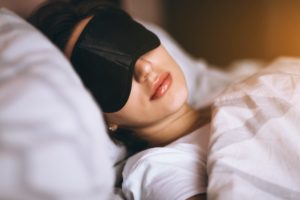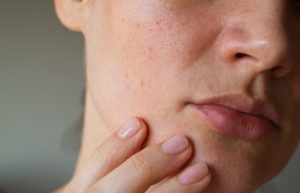Smith-Magenis Syndrome and Sleep
Smith-Magenis syndrome (SMS) is a developmental disorder that affects as many as 1 out of every 15,000 children. The symptoms of SMS vary significantly across people, though children born with SMS commonly develop intellectual disabilities, behavioral challenges, and sleep problems.
People with SMS frequently experience sleep issues , which often begin at a young age. A wide range of sleep difficulties are associated with SMS, including trouble falling and staying asleep, waking up repeatedly during the night, and getting less sleep than others in their age group. People with SMS are also at risk of developing hypersomnia and circadian rhythm sleep disorders.
What Is Smith-Magenis Syndrome (SMS)?
Smith-Magenis syndrome is a rare genetic disorder present at birth that is caused by an abnormality in a person’s chromosomes. Chromosomes are composed of DNA and contain a person’s genes . SMS most often occurs when a part of one chromosome is missing, which results in the loss of a gene called RAI1. Less commonly, SMS can develop due to the presence of a variant of RAI1, rather than the absence of the gene.
Although Smith-Magenis syndrome can be hereditary, the majority of people with SMS do not have a family history of the disorder. Most often, this genetic disorder is due to “de novo” changes in the genes, which means that neither parent has the condition and the genetic change develops in the parent’s reproductive cells during fertilization or in the growing embryo.
Characteristics of Smith-Magenis Syndrome
Common features of Smith-Magenis syndrome include distinct physical features , behavioral challenges, developmental delays, and sleep problems. The signs and symptoms of SMS can differ significantly from person to person and change as a person gets older.
As people with Smith-Magenis syndrome grow, they often develop particular physical characteristics, such as:
- Distinctive facial features, including a broad face and protruding lower jaw
- Broad and short hands
- Dental issues such as missing permanent teeth
It can be difficult to recognize these features during infancy and early childhood, which may delay the diagnosis of this condition until a child’s features become more noticeable, around when they begin attending school.
Most people with SMS do not meet typical developmental milestones as children and have lifelong intellectual disabilities. Early signs of delayed development include less crying, fewer attempts to speak or make sounds as an infant, and failure to meet growth milestones. Delays often become more noticeable during early childhood, when children who have the disorder may also exhibit challenges in language development and the development of motor skills.
People with Smith-Magenis syndrome are often described as having an affectionate and charming disposition. They may have a keen sense of humor and easily remember people they have met and places they have been.
At the same time, behavioral issues are a common characteristic of this condition. Behavioral challenges typically become apparent between 1 and 2 years of age, and become more severe when a child enters school and again when they begin puberty. Challenging behaviors in people with SMS may include:
- Mood swings
- Anxiety
- Difficulties in social functioning
- Self-injury
- Persistent outbursts and tantrums
- Difficulties maintaining attention
- Impulsive behavior
- Issues with using the bathroom
- Stereotyped behavior, such as self-hugging or body rocking
Other symptoms that affect more than half of people with SMS include:
- Short height
- Scoliosis
- Sensitivity to sound
- Abnormalities in the mouth or throat
- Eye disorders
- High cholesterol or triglycerides
- Constipation
Less common symptoms of Smith-Magenis syndrome include seizures, immune deficiencies, cleft lip, and problems with the heart, thyroid, kidneys or urinary tract.
How Does SMS Affect Sleep?
Sleep issues are common in people with Smith-Magenis syndrome and tend to persist throughout their lives. Infants with SMS may be lethargic during the day and take abnormally long naps, while children and adults typically get less sleep than their peers and wake up frequently during the night.
SMS may cause a person to wake up very early in the morning and experience excessive daytime sleepiness. Researchers have also noted that most people with Smith-Magenis syndrome spend less time in rapid eye movement (REM) sleep, the sleep stage in which most dreams occur, than others in their age group.
Many sleep-related symptoms in people with Smith-Magenis syndrome may be caused by a shift in natural circadian rhythms. Circadian rhythms are the near 24-hour patterns in the body that affect the timing of many bodily processes, including sleep and wake times.
Based on their sleep-related symptoms, people with Smith-Magenis syndrome may be diagnosed with a sleep disorder called hypersomnia or a circadian rhythm sleep disorder. In fact, the presence of a circadian rhythm sleep disorder can help doctors distinguish SMS from other developmental disorders. One of multiple circadian rhythm sleep disorders may occur.
- Advanced sleep-wake phase disorder: If a person’s abnormal circadian rhythm leads to persistent early morning awakenings, they may be diagnosed with advanced sleep-wake phase disorder.
- Irregular sleep-wake rhythm disorder: A person with SMS may be diagnosed with an irregular sleep-wake rhythm disorder if the timing of their sleep and wakefulness does not appear to follow a 24-hour circadian pattern. Instead, they may sleep for short periods spread across both daytime and night.
- Non-24-hour sleep-wake rhythm disorder: Non-24-hour sleep-wake rhythm disorder may be diagnosed if a person’s sleep follows a circadian pattern that isn’t tied to the cycle of day and night. In people with this condition, the timing of their sleep drifts later every day.
Children under 10 years old that have Smith-Magenis syndrome may become active late at night. As people with SMS get older, they may be less active late at night, but have increasing difficulties in the evening when preparing for bed and trying to fall asleep.
Sleep disruptions in people with Smith-Magenis syndrome also affect daytime behavior. In fact, the extent of sleep disturbances in a person with SMS correlates to the severity of their behavioral issues.
Causes of Sleep Disorders in SMS
Experts believe that the sleep-related symptoms of Smith-Magenis syndrome may be due in part to the effects of the missing or changed RAI1 gene. Although researchers are still learning about the functions of this gene, it may play a role in a person’s circadian rhythms, brain development, and in the growth of bones in the skull and face.

Disruption to one circadian rhythm, the daily release of melatonin, may be a cause of sleep difficulties for people with Smith-Magenis syndrome. Melatonin is a hormone that helps the body regulate when a person wakes up and falls asleep. Melatonin typically follows a circadian rhythm and, in most people, the release of melatonin increases in the evening to aid the body in winding down for sleep. Exposure to light in the morning then decreases the body’s production of melatonin and helps a person wake up.
For as many as 95% of people with Smith-Magenis syndrome, the circadian rhythm of melatonin is reversed. This means that people with SMS may have abnormally high levels of melatonin during the day. At night, their levels of melatonin may be abnormally low. Problems in a person’s suprachiasmatic nucleus or biological clock, a part of the brain that regulates circadian rhythms, may be partly to blame for dysregulated melatonin production.
Interestingly, not all circadian rhythms appear to be disrupted in people with SMS. Research suggests that there may be additional causes of sleep disturbances in people with Smith-Magenis syndrome. Other proposed reasons for abnormal sleep patterns include an insensitivity to melatonin.
How Doctors Treat SMS
Treatments for genetic disorders like Smith-Magenis syndrome focus on addressing the symptoms of the condition rather than the genetic change itself. This is because changes in genes associated with Smith-Magenis syndrome are present in cells throughout the entire body.
People with Smith-Magenis syndrome may benefit from both medical treatments and support services, depending on an individual’s unique needs. Many treatments focus on addressing complications of SMS like attention deficits, hyperactivity, epilepsy, constipation, scoliosis, and issues related to hearing and eyesight.
Helpful support services for people with Smith-Magenis syndrome may include:
- Early intervention and special education programs
- Speech, occupational, physical, and behavioral therapy
- Job training
Treating sleep issues in people with Smith-Magenis syndrome can be challenging for both doctors and families due to a lack of research studies . To find the right treatment, doctors may need to try multiple medications and see how a person responds to each and whether it causes any new symptoms or side effects. There are several medications that may be recommended to improve the sleep of people with Smith-Magenis syndrome.
- Melatonin: Although no research studies have been conducted in people with SMS, doctors may recommend a trial of low-dose melatonin supplements to improve sleep. Melatonin supplements are often used by people with developmental disabilities who have sleep issues. They are typically taken in the evening.
- Tasimelteon: In 2020, the U.S. Food and Drug Administration (FDA) approved the first treatment for sleep issues in people with SMS. Tasimelteon is a type of medication called a melatonin receptor agonist , which means that it produces similar effects as melatonin in the body. Although researchers are still learning about this medication’s effectiveness, in one study it was able to improve sleep quality.
- Beta-blockers: Beta-blockers are a type of medication often used to treat cardiovascular diseases . When given in the morning, these medications may reduce the amount of melatonin released during the daytime and help reduce daytime sleepiness.
In some cases, doctors may combine medications. For example, doctors may try to normalize the circadian rhythms in a person with SMS by having them take beta blockers in the morning to reduce melatonin production then take melatonin supplements before bedtime to increase melatonin levels.
Experts also recommend that caregivers maintain healthy sleep practices for children with Smith-Magenis syndrome to help improve their sleep quality.
- Consistent evening routines: For people with SMS to get the most out of their sleep, it is important to have a consistent nighttime routine. Caregivers can help make sure that bedtimes and wake times stay the same throughout the week and that a nighttime routine involves sufficient time to wind down with non-stimulating activities. White noise machines may also be helpful.
- Create a safe room: Because of the frequency of awakenings during the night, people with SMS may benefit from a bedroom that is designed for nighttime activity. The needs of individuals vary, but rooms should be free of heavy objects that can be pulled down. It should also contain a bed system designed to prevent falls, and activities that a person can engage in when they are not sleepy.
- Monitor for sleep apnea: People with SMS are at risk of developing obstructive sleep apnea as they get older. Obstructive sleep apnea involves reductions or pauses in breathing during sleep and can further interfere with getting enough rest in people with SMS. Symptoms of obstructive sleep apnea include loud snoring, gasping, or snorting during sleep.
Living With SMS
There are several additional ways in which caregivers, loved ones, and family members can support a person living with Smith-Magenis syndrome.
- Become an SMS advocate: Advocacy is an important aspect of supporting someone with SMS . In fact, advocacy benefits both people with SMS and their loved ones. Becoming an advocate means asking questions, asking about necessary accommodations, and keeping track of a person’s medical history.
- Schedule regular doctor visits: Experts recommend that people living with SMS visit their doctor at least once a year. Doctors can ensure that people with SMS receive appropriate medical care and referrals to needed services. Medical visits are important to monitor a child’s development, assess for complications, and recommend any necessary support services for caregivers and family members.
- Celebrate milestones: People living with developmental disabilities like SMS benefit when their loved ones focus on their strengths, aptitudes, and abilities. Caregivers can empower people with SMS by celebrating their milestones and supporting them in developing positive self-esteem and independence.
Respite care and support is important for the family and caregivers of people living with Smith-Magenis syndrome. Organizations that focus on SMS may be able to provide resources, advocacy, and community support. Connecting with others with similar experiences can be helpful for people with SMS and their loved ones alike.

Still have questions? Ask our community!
Join our Sleep Care Community — a trusted hub of sleep health professionals, product specialists, and people just like you. Whether you need expert sleep advice for your insomnia or you’re searching for the perfect mattress, we’ve got you covered. Get personalized guidance from the experts who know sleep best.
References
14 Sources
-
Smith, A. C. M., Boyd, K. E., Brennan, C., Charles, J., Elsea, S. H., Finucane, B. M., Foster, R., Gropman, A., Girirajan, S., & Haas-Givler, B. (2022). Smith-Magenis syndrome. In M. P. Adam, D. B. Everman, G. M. Mirzaa, R. A. Pagon, S. E. Wallace, L. J. H. Bean, K. W. Gripp & A. Amemiya (Eds.). GeneReviews. University of Washington, Seattle.
https://pubmed.ncbi.nlm.nih.gov/20301487/ -
National Organization for Rare Disorders. (2017). Smith Magenis syndrome., Retrieved January 2, 2023, from
https://rarediseases.org/rare-diseases/smith-magenis-syndrome/ -
MedlinePlus: National Library of Medicine (US). (2021, January 19). What is a chromosome?, Retrieved January 2, 2023, from
https://medlineplus.gov/genetics/understanding/basics/chromosome/ -
MedlinePlus: National Library of Medicine (US). (2016, December 7). Genetic disorders., Retrieved January 2, 2023, from
https://medlineplus.gov/geneticdisorders.html -
MedlinePlus: National Library of Medicine (US). (2021, March 25). What is a gene variant and how do variants occur?, Retrieved January 2, 2023, from
https://medlineplus.gov/genetics/understanding/mutationsanddisorders/genemutation/ -
MedlinePlus: National Library of Medicine (US). (2022, July 29). Smith-Magenis syndrome., Retrieved January 2, 2023, from
https://medlineplus.gov/genetics/condition/smith-magenis-syndrome/ -
MedlinePlus: National Library of Medicine (US). (2018, October 1). RAI1 gene., Retrieved January 2, 2023, from
https://medlineplus.gov/genetics/gene/rai1/ -
Spruyt, K., Braam, W., Smits, M., & Curfs, L. M. (2016). Sleep Complaints and the 24-h melatonin level in individuals with Smith-Magenis syndrome: Assessment for effective intervention. CNS Neuroscience & Therapeutics, 22(11), 928–935.
https://pubmed.ncbi.nlm.nih.gov/27743421/ -
Nováková, M., Nevsímalová, S., Príhodová, I., Sládek, M., & Sumová, A. (2012). Alteration of the circadian clock in children with Smith-Magenis syndrome. The Journal of Clinical Endocrinology and Metabolism, 97(2), E312–E318.
https://pubmed.ncbi.nlm.nih.gov/22162479/ -
MedlinePlus: National Library of Medicine (US). (2021, May 2). How are genetic conditions treated or managed?, Retrieved January 2, 2023, from
https://medlineplus.gov/genetics/understanding/consult/treatment/ -
PRISMS Professional Advisory Board. (2018, January 24). Medical management guidelines for an individual diagnosed with SMS., Retrieved January 2, 2023, from
https://www.prisms.org/wp-content/uploads/pdf/mmg/PRISMS_Medical_Management_Guidelines2018.pdf -
AHFS Patient Medication Information. (2021, May 15). Tamismelteon. American Society of Health-System Pharmacists, Inc., Retrieved January 4, 2023, from
https://medlineplus.gov/druginfo/meds/a615004.html -
Farzam, K., & Jan, A. (2022, July 21). Beta blockers. In StatPearls. StatPearls Publishing., Retrieved January 2, 2023, from
https://www.ncbi.nlm.nih.gov/books/NBK532906/ -
National Center on Birth Defects and Developmental Disabilities, Division of Human Development and Disability. (2020, September 16). Disability & health information for family caregivers. Centers for Disease Control and Prevention., Retrieved January 3, 2023, from
https://www.cdc.gov/ncbddd/disabilityandhealth/family.html

































































